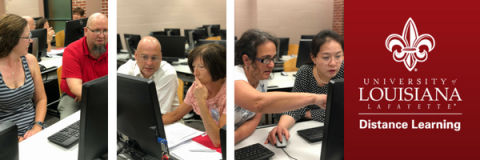Meet the Instructional Support Team

In Distance Learning, the Instructional Support team isn’t just the resource for making sure EduTools work or overcoming Moodle hijinks.
The five members that comprise Instructional Support bring decades of teaching, course design and instructional technology experience to our shared goal: creating engaging and interactive online course delivery alongside faculty, the subject matter experts.
Senior Instructional Designer Carey Hamburg came to Distance Learning five years ago, as he saw the three themes of his professional life — art, technology, and education — married into a single position.
Carey started as a “USL” student in architecture, transitioned to applied arts, and later worked building interactive museum exhibits. The practice piqued his interest in multimedia, after which he pursued his Master's in Communication at the University of South Alabama, with a focus in Multimedia Training Development.
“Everything I’ve done has had some education component,” he says, “and it’s always had some artistic design to it.”
One of the main reasons Carey says he got involved in education is to help people solve problems or unlock something they didn’t know they could do. Sometimes that means solving for instructional goals by exploring underutilized tools.
“There’s so much that Moodle can do that is more interesting and engaging that we don’t take advantage of,” he says. “We probably don’t use even 80 percent of what it could do.”
Carey’s experiences allow him to think outside the box, approaching problems from an array of perspectives to meet the needs of different learners.
“We want to put faculty and students in the best place to succeed,” he said. “Part of what I enjoy is getting to know the faculty and how they interact and work best.”
Similarly, Instructional Designer Angela Lee finds herself drawn to universal design practices, an approach that creates a space for all learners, regardless of ability or style.
“A learner doesn’t have to be disabled to need a different approach or modality to course materials and information,” Angela says. “We’re not the subject matter experts, but we can help present it to students in different ways to reach more learning styles. Maybe it’s a podcast, maybe it’s a video, maybe it is text.”
Angela served as an instructor and then dean in the technical college system, teaching both face-to-face and online courses. When she began to explore graduate programs, Instructional Technology was the logical choice for her Master’s.
Our Designers are here to not only provide support through the duration of a course, but can also help at inception to head off potential pitfalls and establish interventions for students.
Dr. Diana Wu joined the support team from Virginia Tech and says getting down to data through adaptive learning can help create those interventions.
“Compared to face-to-face, there are different technologies for online-based courses to analyze the students’ learning progress,” she says. “If you detect any issue, you can provide support in time to help students succeed.”
While at Virginia Tech, Diana earned both her Master’s and Doctorate in Instructional Design and Technology, leading to her role there as assistant director for the Office of Instructional Technology.
She says she had a reputation for being easy to work with and being very supportive and flexible in providing hands-on support when and wherever possible to ensure a quality distance learning experience.
That has become easier, she says, as more technologies are adopted and integrated into online learning.
“One of the challenges before we had VoiceThread and similar technology, was engaging students and increasing the student-faculty interaction and student-student interactions,” she says. “Now we have many handy technologies we can support to raise engagement, as well as design instruction to motivate engagement and interaction so students do not feel they are by themselves.”
Instructional Technologist Mike Williams makes sure those technologies work the way they’re supposed to, when they’re supposed to.
“As the instructional technologist, my specific role is to manage and support the EduTools,” he says. “When they don’t work, my goal is to figure out why.”
As an instructor at various institutions before coming to Distance Learning, Mike always found he was the “unofficial IT guy,” setting up hardware and helping colleagues troubleshoot software.
When he saw the opportunity to enter a new cross-section of his job duties, he leaped.
“Folks ask the question of how can online education be as engaging as face-to-face teaching,” he said. “Having been an online student and instructor, I enjoy being able to show faculty that instruction in an online environment can be even more engaging than face-to-face.
“The technology we provide can allow them to do things beyond what they thought was possible in a face-to-face classroom.”
Andrea Leonard, who joined the team as an instructional designer in May 2019, has been exploring new ways to engage with students and create personalized online educational pathways through adaptive learning.
“Adaptive technology fosters personalized learning,” Andrea says. “Not everyone will receive the same experience, but everyone will achieve the same learning objectives. It helps learners focus where they need the most help and it won’t overwhelm learners with constant new information if they haven’t yet mastered previous skills.”
In her role, Andrea's goal is to help faculty members get the most out of the courses they’re creating while expanding the use of adaptive learning methods.
As designers, technologists, and faculty work together to push the bounds of possibility in online learning, Mike says the team is always looking for feedback to keep distance learning moving forward.
“The faculty are the front line troops; they’re the ones using our tools so they can be a great resource to us,” he says. “We want to hear about things that work so we can share that, but we also want to hear about what’s not working. We’re always interested in improving.
“We’re open to suggestions.”
Request a consultation today for a one-on-one meeting with one of our team members to address your course goals and objectives.
